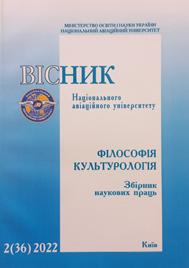JUSTIFICATION OF THE SPECIFICITY OF PHILOSOPHICAL PROCESS CONTINUITY WITHIN THE MODERN-POSTMODERN OPPOSITION
DOI:
https://doi.org/10.18372/2412-2157.36.16969Keywords:
pre-modern, modern, post-modern, contemporary, presentAbstract
Introduction. Сontemporary philosophy is based on principled pluralism, the multiplicity of approaches, and equality of viewpoints and
positions. And this is the first difference from the modern approach because the main task is understanding reality, not constant proof of
the truth. That is why modern philosophy does not renounce the possessions of the previous modern tradition but rather treats them
selectively, looking for something that can be useful. The aim and tasks of the study are to highlight certain aspects thanks to which it
is possible to make an attempt to substantiate the persistence of the philosophical process within the limits of the Modern-Postmodern
opposition. Research methods are analytical, interpretation, and deconstruction. In order to show that the era of modernism and
Modern itself in its pure form is not an empty label that can be applied to anything, it is worth considering some positions and
approaches to the phenomenon of «modernism», as well as selectively paying attention to how some issues that took place in modern
philosophy are interpreted. Research results. First of all, we turn to the position of Peter Kozlowski, who draws attention to the fact that
modernity has, as the main feature, a tendency to mostly express the «real» world. The quintessence of today's spirit is that it, being a
complex ideological current (sometimes categorical), does not accept previously established ideas about the world and man. There is
no radical rejection of the previous, in particular, modern tradition. But there is a reinterpretation of the modern heritage in such a way
that it becomes convenient and acceptable teaching, and accordingly, valuable and significant. Jürgen Habermas dwells on the fact that
the modern tradition strives in every way to create a picture of the world with a claim to universality and at the same time with a clear
attempt to reduce all the multiplicity and variability of reality to a single system, which could completely pass for a solid foundation and
foundation. Discussion. Although this is unacceptable for the present, which throws up any depth and foundation. But after rejecting the
very basis and foundation, the same postmodern does not abandon modern methodology, scientific approaches, etc. J. Derrida, with his
proposed project of «deconstruction», in fact, offers a kind of strategy for the modern tradition, which consists in the setting: «read
between the lines», «look for that even where it could not be», «say for the thinker, what he did not say or wanted to say». He illustrates
this approach with the example of Hegel's creative achievements. Conclusion. Thus, the long-lasting nature of the Modern-Postmodern
opposition can be justified already based on the position of modernity, which prefers viable philosophical formulas and, rejecting purely
theoretical attitudes, with the help of categorical transformation changes the non-viable theoretical stock of knowledge into, albeit
unstable, but balanced material useful for solving problems of reality.
References
Badiou A. Manifestepourla philosophie. P. : Editionsduseuil, 1989. 184 p.
Foucault M. The atrum philosophicum in Critique. Paris, 1970. Р.591–592.
Justine C. Hannah Arendt penserla modernite. Sciences humaines, 7/2012. №239. Р. 37–39.
Poirson M. Artetargenten Franceautempsdes Premiers Modernes (XVIIe–XVIIIesiècles). Oxford : VoltaireFoundation, 2004. 341 p.
Агамбен Дж. Що є сучасним? / пер. с італ. Августина Соколовскі. К. : Дух і Літера, 2012.
Божович М. «Істеричний матеріалізм Дідро». Логос. 2003. №3. С. 66–79.
Козловскі П. Сучасність постмодерну. Питання філософії. 1995. № 10. С. 87.
Хабермас Ю. Філософський дискурс про модерн. Вид-во «Весь світ», 2003. 416 с.

